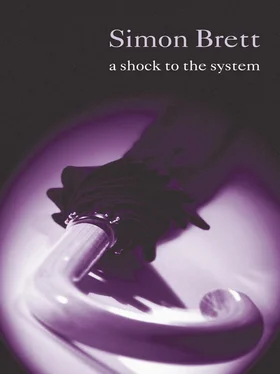Simon Brett - A Shock to the System
Здесь есть возможность читать онлайн «Simon Brett - A Shock to the System» весь текст электронной книги совершенно бесплатно (целиком полную версию без сокращений). В некоторых случаях можно слушать аудио, скачать через торрент в формате fb2 и присутствует краткое содержание. Жанр: Криминальный детектив, на английском языке. Описание произведения, (предисловие) а так же отзывы посетителей доступны на портале библиотеки ЛибКат.
- Название:A Shock to the System
- Автор:
- Жанр:
- Год:неизвестен
- ISBN:нет данных
- Рейтинг книги:3 / 5. Голосов: 1
-
Избранное:Добавить в избранное
- Отзывы:
-
Ваша оценка:
- 60
- 1
- 2
- 3
- 4
- 5
A Shock to the System: краткое содержание, описание и аннотация
Предлагаем к чтению аннотацию, описание, краткое содержание или предисловие (зависит от того, что написал сам автор книги «A Shock to the System»). Если вы не нашли необходимую информацию о книге — напишите в комментариях, мы постараемся отыскать её.
A Shock to the System — читать онлайн бесплатно полную книгу (весь текст) целиком
Ниже представлен текст книги, разбитый по страницам. Система сохранения места последней прочитанной страницы, позволяет с удобством читать онлайн бесплатно книгу «A Shock to the System», без необходимости каждый раз заново искать на чём Вы остановились. Поставьте закладку, и сможете в любой момент перейти на страницу, на которой закончили чтение.
Интервал:
Закладка:
Simon Brett
A Shock to the System
CHAPTER ONE
The first murder was almost accidental. Indeed, if it had ever gone to court the charge would probably have been manslaughter.
But the legal difference between the two crimes can be one of intention, and there is no doubt that at the moment he hit the old man, Graham Marshall intended to kill him.
And that was his first taste of the power of death.
But murder can also be reduced to manslaughter by provocation, and there was no doubt in Graham Marshall’s mind that at the moment he killed the old man, he was provoked beyond human endurance.
Not provoked so much by the importuning of his victim, as by the entire forty-one years of his life. It had been a life, it seemed to Graham, of false promise and false promises; a life of carrots dangled, prizes offered, a long sequence of incentives to lure him along a road which he had only recently discovered to be a dead end.
That the realisation had taken so long to come only made it the more bitter. Like the victim of an elaborate confidence trick, he had contributed to his own deception, and was that much more reluctant to accept the real facts. For a long time he had refused to believe that he was up against a blank wall, convincing himself that the way out was merely hidden, and that finding it was another challenge to his proven intelligence and acknowledged ingenuity.
But the events of the Thursday in March 1981 that led up to the old man’s death left him no further excuse for self-deception.
He was sealed off in a dead end, too far along the road to turn back and make a new start. And the gold for which he had spent forty-one years prospecting was fool’s gold.
His life up until that point had been a series of competitions, and the only thing they had in common was the fact that he had won them all. With his new cynicism, he could see that the competitions had been limited in scope, his aspirations prudently pitched at his own level of ability, but he had not realised this at the time, and had faced each new test with regenerated enthusiasm and the determination to pass, to come out on top.
His parents had set the competitive tone of his life. For their son, subsequently to prove their only child, conceived in 1939 and born into a Britain at war, they had wanted the best, better at least than the hard road they had travelled through the privations of the ’Twenties and ’Thirties. Graham’s father, who had worked himself up from a local government office in Rotherham to clerical eminence in the Ministry of Agriculture and Fisheries, saw daily the easier advance of colleagues with public school and university backgrounds, and determined that his son should have these advantages. Economy came naturally to Eric Marshall, and he forced it on his wife. Economy was the reason they restricted their family to one child. Any parsimony in the small semi in Mitcham, where they moved after the war, was justified if it contributed to Graham’s education. ‘Public school and university,’ Mr. Marshall kept saying, ‘they’re the keys to the system — got to have those if you’re going to get anywhere, Graham.’
A prep-school was the first essential. Graham probably never knew his parents’ tension as they presented their son to the ex-Harrovian headmaster of a minor establishment in Streatham. Nor their relief when he passed this, the first of his public tests.
The school’s attitude mirrored his parents’. Weekly progress reports, and a seating plan regularly reorganised according to academic achievement, encouraged Graham’s competitive nature. And the fact that he was rarely out of the top three desks gratified both pupil and parents. Meanwhile, he shed their Northern vowels and adopted the speech patterns of the other boys at the school.
Common Entrance was Graham’s next public assessment and again he was not found wanting. A day-school in New Malden, whose headmaster attended the all-important conference which justified the name of ‘public school’, welcomed the aspirant with arms wide enough to include a small scholarship.
Once there, when the run-up to O-levels demanded that the pupils specialise, Graham followed his father’s advice, based on the observation that ‘there’ll always be jobs for teachers’, and concentrated on languages, intensifying his studies of French and adding German.
These disciplines, in which words corresponded with other words, and answers were either right or wrong, suited the analytical turn of his mind, and he easily cleared the next hurdles of good marks in O-levels, A-levels, and finally — a peak hitherto unsealed in the Marshall family — entrance with a much-prized ‘State Scholarship’ to the University of Leeds where he was to read French and German (and, incidentally, just miss National Service).
The cynicism of forty-one years diminished these achievements in retrospect.
Post-war stringencies had made the prep-school desperate for pupils; the public school had been an extremely minor one; and Leeds University was not Oxbridge. But at the time they had been important milestones on the road to being a ‘success’. Indeed, Graham became accustomed to hearing the word ‘success’ associated with his name. His parents and their friends used it often; even some of his fellow students used it, not without ambivalence, but still with admiration for his quick intelligence and dedication.
But achievement in examinations, where the rules were simple and unvarying, did not inevitably mean success in ‘the outside world’, an expression he heard increasingly during his final year at Leeds. ‘The outside world’ was full of achievers of different backgrounds, making their own rules. To earn the title of ‘a success’, Graham knew he had to contend with, and beat, this new competition.
It was therefore regarded as a significant — indeed, huge — triumph, when he won, against a reputed opposition of six hundred applicants, one of six Management Traineeships with the British subsidiary of the international oil company, Crasoco. The achievement was the greater because the opposition was not made up exclusively of university graduates, but included applicants who had been through National Service and older men from other oil companies, candidates with long experience of ‘the outside world’.
For Graham’s parents the appointment was a vindication of the long years of abstinence. Their investment had paid off. Their pride in their son knew no bounds. But with the pride came a certain distance, a recognition that Graham had now achieved that step-up into another earnings-bracket — potentially even another class — for which they had so ardently worked. And that his experiences in life would have a decreasing amount in common with their own.
So when, during the two years of his traineeship, he came back to Mitcham with stories of flying to the Middle East to inspect oil wells, of staying in the best hotels on company expenses, they regarded him with something approaching awe.
And when he moved into a flat in Kensington with three other young men, one of whom had been to Eton, the awe increased. As it did when he spoke casually of dinners eaten out in Chelsea bistros, of sports cars bought and sold, or of foreign holidays.
So far as his parents were concerned, there was no doubt of Graham Marshall’s right to the title of ‘a success’.
And, within Crasoco, it seemed to be increasingly applicable. After his two years’ induction Graham confounded the expectation that he would use his language degree in a foreign posting by opting for administration. He applied for, and obtained, a staff appointment in the Personnel Department, where he quickly demonstrated an unsuspected talent for management, his quick intelligence and sufficient personal charm steering him fluently through the intricacies of meetings and committees.
Читать дальшеИнтервал:
Закладка:
Похожие книги на «A Shock to the System»
Представляем Вашему вниманию похожие книги на «A Shock to the System» списком для выбора. Мы отобрали схожую по названию и смыслу литературу в надежде предоставить читателям больше вариантов отыскать новые, интересные, ещё непрочитанные произведения.
Обсуждение, отзывы о книге «A Shock to the System» и просто собственные мнения читателей. Оставьте ваши комментарии, напишите, что Вы думаете о произведении, его смысле или главных героях. Укажите что конкретно понравилось, а что нет, и почему Вы так считаете.












